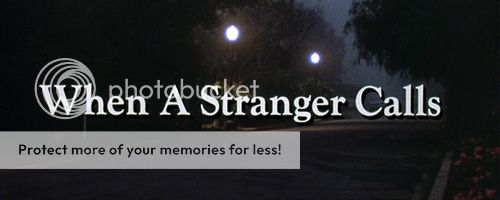- Joined
- May 21, 2011
- Messages
- 25,385
- Reaction score
- 889
- Points
- 118
- Age
- 47
- Favorite Wrestler
-

- Favorite Wrestler
-

- Favorite Wrestler
-

- Favorite Wrestler
-

High school student Jill Johnson is traumatized over an evening of babysitting by a caller who repeatedly asks, "Have you checked the children?" After notifying the police, Jill is told that the calls are coming from inside the house. Jill barely manages to escape but the children are not as fortunate and are soon found brutally murdered. The killer, a man named Curt Duncan, is caught and sent to a mental institution. However, seven years later he escapes and soon sets his sights on Jill, who is now married with children of her own.
1979’s When A Stranger Calls has undoubtedly earned a place in the pantheon of great horror films merely for its opening sequence, which has not only inspired the film Scream but also become a go-to campfire ghost story. However, this sequence is just a part of what makes the film great, it’s also a tight little thriller and an excellent character study all wrapped up in one nice, neat package. While it takes a major chance in focusing the majority of its second act on the villain of the picture, it not only succeeds but also manages to make the film that much creepier. Once we get to know this villain, we’re not sympathetic to his plight, but we’re sure afraid of him, perhaps more than many others that have come before or after. The stark realism along with some excellent performances more than make When A Stranger Calls worth phoning home for, the unbridled terror is just the cherry on top of the tombstone.
Written and directed by Fred Walton (April Fool’s Day), the film was originally intended to be a mere 20 minute short. However, once Walton saw the popularity of slasher films such as Halloween and Black Christmas, he soon expanded the film to a theatrical feature and hired Steve Feke (Poltergeist III) to help him flesh out the story. While it’s true the opening sequence is the best part of the film and the most well-known, the work that these two do in building the film into more than just a shock piece is quite solid. Rather than relying on the standard trope of a killer stalking multiple victims, they chose instead to focus on the killer attempting to adjust to a society that he was clearly not meant to be a part of. Of course once he comes to this realization he reverts to his old ways and goes after his original target, but in the meantime we’ve learned more than enough about this guy to know that he’s seriously bad news. While the pacing is not the best, Walton does manage to keep things moving along nicely and also throws up a pretty foreboding sense of doom throughout the proceedings.
As the film is a character study at heart, it was important to find an actor capable of playing that character to the highest degree of believability. Enter Tony Beckley, a superb British actor who had found success playing character roles in films such as The Italian Job and Get Carter and television villains, most notably the quite insane Harrison Chase in the Doctor Who serial The Seeds of Doom. Unfortunately Beckley was stricken with cancer and was extremely ill during the filming of When A Stranger Calls, but that didn’t stop him from giving his career performance in the role. Quite simply put, Beckley IS this film, and his tortured yet demented performance as Curt Duncan is mesmerizing in every way. Sadly, Beckley would pass away before the film was officially released, but his legacy as an actor is firmly cemented with this role. Meanwhile, Hollywood legend Charles Durning shows up to lend some credibility to the picture and does a good job playing the standard detective character. Carol Kane (who was just about to break out in the television show Taxi) plays Jill, the harried victim, and also gives a convincing if somewhat paint by numbers performance. Finally, Colleen Dewhurst has a small but crucial role as another potential victim and does quite a lot with it in a short amount of time.
While it does maintain a sense of coherency throughout, the film's focus does tend to waver, as Curt Duncan switches from the hunter to the hunted. This is most prevalent in a scene where he attempts to make small talk with a woman at a bar only to offend her and subsequently get the crap kicked out of him by another patron. The sight of the beaten and bloody Duncan does allow for some sympathy, although at the same time it's hard for the viewer not to remove themselves from the fact that this man brutally murdered two small children. While I've heard that Walton purposely attempted to split the audience in regards to their sympathy for Duncan, I personally do not see it that way. Rather I feel that he was simply trying to show people how pathetic this man was and how he was truly meant to be institutionalized for the rest of his life. Towards the end of the film, the character appears to be in such a bad state that I couldn't help but wish that he'd be put out of his misery, although those feelings could also have something to do with the fact that, again, he murdered two small children. Regardless of Walton’s supposed intentions, the fact remains that Duncan is evil personified, and while he certainly has moments of sympathy can any of them possibly hope to outweigh the heinous acts he has committed? This ability to make the viewer examine and question their beliefs in regards to this man helps to set When A Stranger Calls apart from many of its contemporaries and it remains a strong and scary wake up call to the dangers of mental instability. 7/10.
â€Coming up tomorrow…do NOT make this guy mad.â€





















 :
:





